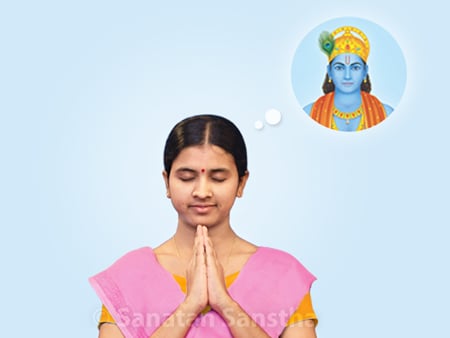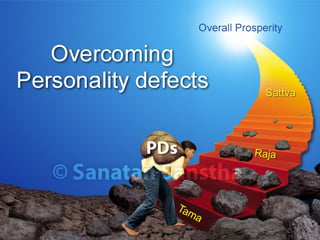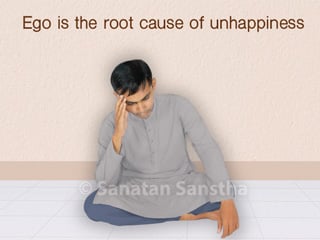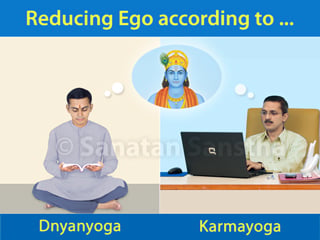1. Being aware that the body is not ours, but belongs to God

Considering yourself to be the body is the greatest mistake. The second mistake is to love the body considering it to be your own. Still greater mistake is to nurture the qualities of the body, that is, desires and instincts. Once these defects develop, then instead of curbing their development we get carried away under their influence, and on occasions we even forsake our intellect. If we have to cut a tree, then first we will have to hack its branches and then its trunk. Similarly, if we want to perform spiritual practice, we will have to curb the desires of the body (akin to cutting the Branches of the tree).
2. Instead of having a bhav
that ‘God is mine’, thinking that ‘I belong to God’
While having bhav about God, we should think that ‘I belong to God’ and not ‘God is mine’, since otherwise it will again lead to generation of ego. Only if we have a bhav that ‘I belong to God’ will we feel like serving God sincerely.
3. Having an awareness that everything belongs to God
God is the creator of the universe. He is omnipotent, omniscient and omnipresent. Without His permission, we can neither speak nor remain silent. We can neither renounce our body nor remain alive. Without His wish, not even a leaf can stir. Hence, we should have an awareness that everything in the world (including all that we consider be our own) belongs to Him alone. Then we will not feel self-righteous of our possessions.
4. Having an awareness that God is everywhere
If we live our life constantly with the awareness that God Is everywhere, it will help reduce thoughts about the self and enhance bhav towards God .
5. How to reduce ego by
considering that God Himself does everything
Once Shri Gurudev Ranade received an invitation on the following lines – ‘We are going to celebrate the saptaha (A seven day series of lectures on Shrimadbhagawad) from the new-moon day. You are requested to attend the function.’ Upon reading this, Gurudev said, “What is the meaning of we are going to celebrate? We should say, it is going to take place”.
It is superior to consider that God Himself performs all actions, than to performing actions while chanting God’s Name, which in turn is superior to performing an action and offering it unto God.
We should perform actions ourselves, but have a bhav that what has happened, what is happening and what will happen, all belongs to God and for my welfare. God is getting the action done through me. We should not say that I performed an action, since then ‘I’ is separated from God. While imparting information on Spirituality, we should not feel bad if people do not listen to us or do not accept it. Also, we should not feel proud if they listen to us. We should constantly have a bhav that whatever happens, happens because of God’s wish.
Even in worldly life (as in spirituality), we should have a bhav that God has done it; for example, instead of ‘I learnt’, we should have a bhav that ‘God has taught me’, ‘God has given me a task’, ‘God has arranged the marriage’, etc. When we do not have control over simple physical occurrences such as hunger, sleep, sneezing, yawning, then what can we feel egoistic about ?
6. How to reduce ego by surrendering completely unto God
Mahabharat has the following incident. Pandavs lose a game of dice to the Kouravs. Duryodhan asks Dushasan to bring Droupadi (wife of the Pandavs) into the royal court and disrobe her. Droupadi begins to pray to Shrikrushṇa. Finally, Shrikrushṇa comes to her rescue and provides her with clothes and protects her modesty. Then Droupadi asks Shrikrushṇa, ‘Why Did you take so long to come?’ Shrikrushṇa replies, ‘So long as you clutched to your clothes, you had the hope that you would be able to protect your modesty. However, when you realized that you cannot protect yourself and you surrendered yourself completely unto Me, only then did I come to your rescue’.
7. Prarthana (Prayer)
The word prarthana is derived from the words pra (प्र) + artha (अर्थ) , which means pleading fervently. Praying earnestly to God with humility for something is known as prarthana. (A Seeker who is blessed by a Guru, mostly prays to the Guru). When we pray to God for something, we express our helplessness; also, then doership does not rest with us, but rests with God. Since the Guru or God says, ‘So Be it – तथास्तु’, not only do we get the desired benefit from the prayer, but a bhav develops that the Guru or God gets the task done. Hence, ego about the task is not generated.
For the fulfillment of any task, prayers alone are not sufficient; instead, we should make efforts with the prayers, since God offers assistance according to the proverb, ‘प्रयत्नान्त परमेश्वर’, God can be achieved through effort. God does not help those who do not have an attitude of making efforts.
8. Gratitude
God is the Creator of the entire creation. We are a part of this Creation. Hence, having awareness of God or of one of His forms, wherever and whenever the thought of ‘I’ and / or the world arises in the mind, and attributing even this awareness to God is known as gratitude.
Another meaning of the word ‘prayer’ is surrender, and the process of surrender is not complete without expressing gratitude.
By expressing gratitude, the doership is offered unto the Guru or God, and this helps reduce ego.
9. Having an awareness that
spiritual progress takes place by God’s grace alone
If the seeker constantly has an awareness that his spiritual progress takes place due to God’s grace alone since He Himself is the doer, then he does not develop ego about his spiritual practice.
Reference : Sanatan Sanstha’s Holy text ‘Spiritual Practice for Destroying Ego’.


 How to reduce Ego problem According to Psychology
How to reduce Ego problem According to Psychology Harm incurred due to high ego and why it is important to destroy ego ?
Harm incurred due to high ego and why it is important to destroy ego ? Signs of Spiritual growth after reduction in Ego
Signs of Spiritual growth after reduction in Ego Methods of Ego reduction according to Karmayoga (Path of Action) and Dnyanyoga (Path of Knowledge)
Methods of Ego reduction according to Karmayoga (Path of Action) and Dnyanyoga (Path of Knowledge) Reasons of Ego development
Reasons of Ego development